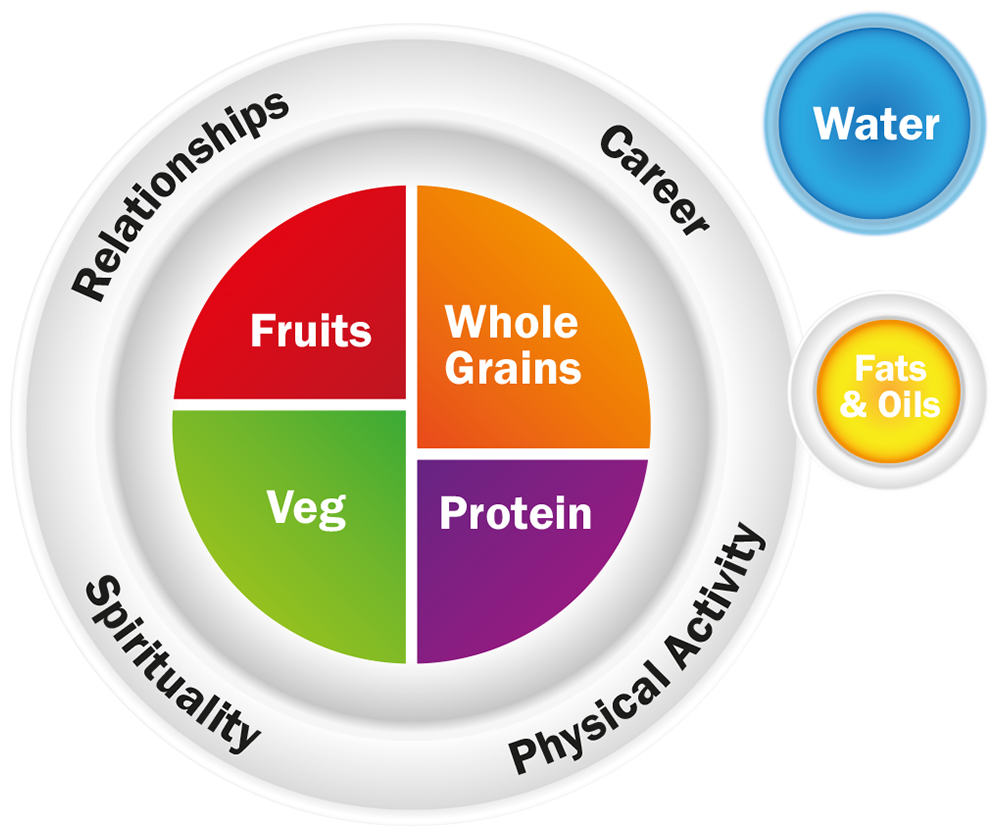Food is an integral part of our daily lives, not just as a source of fuel for our bodies, but also as a form of enjoyment or to fulfil some other need. However, the availability of an immense selection of food and drinks in most parts of the world have led to unhealthy relationships with it, affecting not only our physical health but our mental health too.
Because every individual has different circumstances and different views on food, many people have turned to Integrative Nutrition, which goes beyond general dietary guidelines and considers all aspects of a person’s life when determining what is best for their health and diet. The core principles of Integrative Nutrition are aligned with the concept of ‘primary’ and ‘secondary’ foods.
Primary Foods are the aspects of our life that are consumed OFF the plate, i.e., career, creative outlets, relationship, news, social media, and the things that bring us joy.
Secondary Foods are the physical food and drinks that we consume ON the plate to nourish our bodies.
How Do Our Lives Affect Our Food Choices?
Integrative Nutrition focuses on primary foods first because the circumstances of our lives and the environments in which we live have an impact on our overall health. These components also directly affect what we eat and when we choose to eat it.
For example, after a difficult day at work, it may be more tempting to reach for foods that contain higher levels of sugar, salt and fat, as a way to soothe ourselves or suppress an emotion in order to cope better.
Cultivating a Healthy Relationship with Food
The first step in cultivating a healthy relationship with food is to begin to observe when and where you are choosing to eat and acknowledge any emotions you may be feeling when making those decisions. You may find it useful to keep a food journal if you are trying to make long-term changes to your health and eating habits, as it will enable you to see if any patterns emerge. To do this, split a piece of paper into three columns with the following headings:
- 1.) Time food/drink consumed:
2.) What I consumed:
3.) What was the emotion/driver to eat/drink?
If you notice that certain stressors in your life are playing a role in how and what you’re eating, it is important to identify and work through these before embarking on any dietary changes, as you will likely have more long-term success.
While some people may be able to do this journey alone, others will have more complex needs and may require the support of a Health Coach, nutritional therapist or therapist specialising in disordered eating.
Signs of A Good Relationship with Food
- You are able to recognise hunger cues, eat when hungry and stop when full
- No foods are ‘off-limits’
- You are aware of your body’s nutritional needs
- You don’t let other people’s opinions dictate what you eat
- Calories are not the sole focus of your food choices
- You are knowledgeable about nutritious foods and how they are used by the body
Many people are raised with the concept that some foods are ‘good’ and others are ‘bad’. These ‘bad’ foods usually relate to the ultra-processed sweets, snacks and fast foods that are widely available today. By labelling them in this way, however, it gives the food power.
When we limit our choices and stay away from certain ‘bad’ foods, it only increases desire for it. Often, it can also lead to unrestricted eating of that item when we ‘give in’ to temptation, eating more than we would have if it was not perceived as ‘bad’. This is what is known as ‘counter-regulation’. By removing a food’s power, it becomes less interesting, and our bodies crave it less over time. It is important to remember that it is not the individual food that is bad, but how much and how often we eat it.
Mindful Eating
Once you have begun your wellness journey, you can deepen your awareness of food choices by practicing eating mindfully. By asking yourself inquisitive questions, you can gain greater insight into how and why you eat. Try these question prompts during your next meal or snack:
- Does eating this food satiate my hunger?
- Am I actually hungry? Or am I eating due to a strong emotion or unmet need?
- Does this food or drink satisfy the craving I had?
- What flavour or texture am I noticing?
- Am I eating/drinking simply because it was easy and available to consume?
- Has eating/drinking this solved my problem?
If you would like to make positive changes to your health and wellbeing and need help with your relationship to food, then please seek professional support. Trained therapists and coaches can help you navigate your relationship with food based on your history and individual circumstances.
The following resources may be useful for you to begin your wellness journey:
Patient.info - Ways to Improve Your Relationship with Food
Mindful Eating - The Client's Relationship with Food
Weill Cornell - Helping Your Kids Develop a Healthy Relationship with Food
BACP - What Therapy Can Help With: Eating Disorders
Mind - Treatment and Support for Eating Problems
Beat Eating Disorders - Nightingale Online Support Group
Author: Rachel Alexander - Holistic Health Coach at Mind.Body.Wisdom

